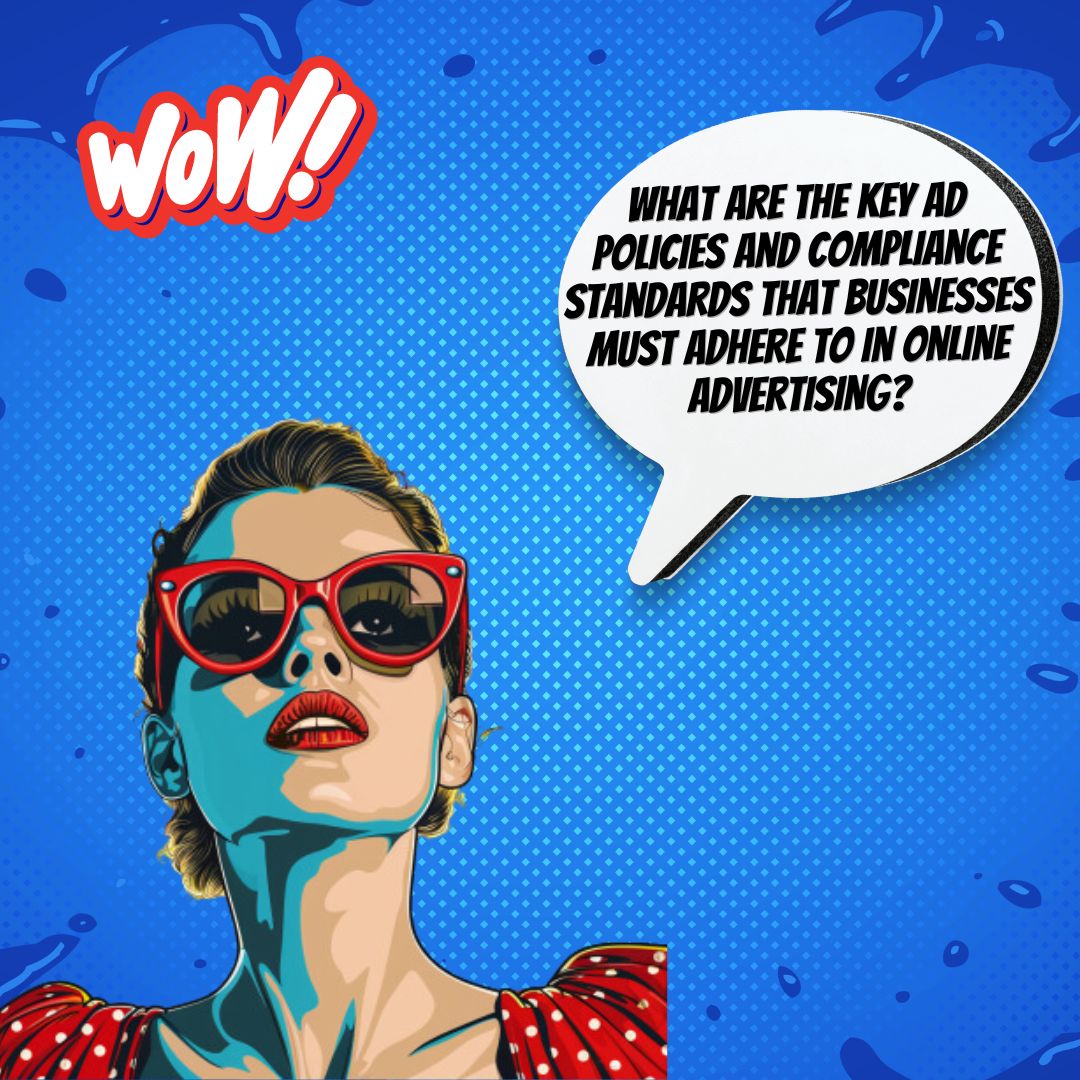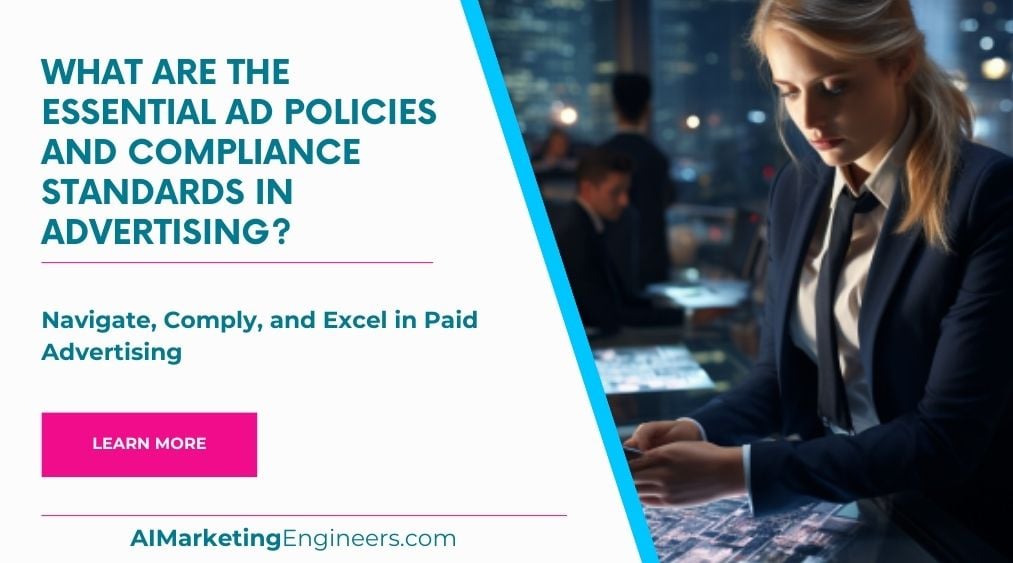Key Takeaways
✅ Adherence to Guidelines: Understanding and following key ad policies, such as those set by platforms like Google and Facebook, is crucial. These guidelines ensure that ads are not misleading, offensive, or harmful, which helps maintain a fair and trustworthy advertising environment for both businesses and consumers.
✅ Legal and Ethical Compliance: Adhering to compliance standards prevents legal issues and penalties. Businesses must ensure their ads comply with regulations such as GDPR, FTC guidelines, and other local laws. This adherence not only avoids fines but also protects the company’s reputation and fosters consumer trust.
✅ Consumer Protection and Trust: Implementing and following ad compliance standards helps build and maintain consumer trust. Transparent, honest, and ethical advertising practices reassure consumers that businesses value their rights and interests, leading to stronger customer relationships and loyalty.

Introduction
Understanding the intricate world of paid advertising and its compliance standards isn’t just good practice—it’s a necessity for businesses aiming to leverage digital markets. Whether you’re a small business owner or a marketing executive, getting to grips with statutory regulations and platform-specific policies is imperative to avoid pitfalls that could sidetrack your success.
Did you know, according to a recent survey, over 60% of new advertisers find compliance the most challenging aspect of launching new campaigns? In this article, we tap into the pressing issues and proffer solutions that aim to not only enhance your Return on Ad Spend (ROAS) but ensure you are playing by the rules—thus mitigating risks of penalties or ad denials.
Stay tuned as we unfold actionable insights and pioneering strategies tailored to empower your advertising efforts, keeping them transparent, compliant, and above all, effective.
Top Statistics
| Statistic | Insight |
|---|---|
| Global Digital Ad Spend: Expected to reach $455.3 billion in 2021, growing at 10.4% in 2022. (Source: eMarketer) | Reflects the tremendous growth and potential in digital advertising, signaling a robust market. |
| Brand Safety Concerns: 69% of marketers consider it a top concern. (Source: IAS) | Highlights the importance of maintaining brand integrity in ad placements to avoid consumer backlash. |
| Offensive Content Impact: 74% of US consumers would stop buying if ads are near offensive content. (Source: AdColony) | Stresses the critical need for contextual ad placement and content alignment to retain customer loyalty. |
| Ad Fraud Rate: Estimated to be 15% to 25%. (Source: Juniper Research) | Illuminates the risks and financial implications, emphasizing the necessity for stringent ad verification processes. |
Understanding Paid Advertising Compliance Standards
When you shell out money to put your ads in front of customers, knowing the rules of the game is crucial. At the core of paid advertising are policies and compliance standards that ensure advertisements are fair, truthful, and non-deceptive. Regulatory bodies and various advertising platforms enforce these policies to protect consumers and maintain the integrity of marketing practices. The balance of power between advertisers and consumers rests heavily on these standards.
The Pillars of Ad Policies and Guidelines
Every advertiser must navigate a landscape filled with “do’s” and “don’ts”. Prohibited content includes blatant no-nos like hate speech, scams, or adult content, as ensuring a safe environment for viewers is paramount. Restricted content, on the other hand, touches sensitive areas like alcohol or healthcare products, where ads can appear but only under tight constraints. Equally important are the ad format rules, such as specific text-to-image ratios and character limits, guiding how an ad should visually appear in user feeds.
Role of Regulatory Bodies in Advertising
Agencies like the Federal Trade Commission (FTC) in the U.S. and regulations like the General Data Protection Regulation (GDPR) in the EU are the watchdogs of advertising. They enforce principles that demand truthfulness and accuracy. Ads need to be clear about who’s sponsoring them, disclose accurately what the product does, and protect user data fiercely. These guidelines aren’t just about obeying the law; they fundamentally shape the trust consumers put in advertising.

Navigating Social Media Advertising
Platforms like Facebook, Instagram, Twitter, and LinkedIn each have their own set of advertising rules, which often update to reflect new ethical or legal considerations. Understanding these can be a game changer, particularly in how businesses segment their audiences or target ads. While these tools offer powerful ways to reach specific demographics, they also come with risks, especially if advertisers inadvertently violate platform-specific policies leading to ad pauses or account suspensions.
Enforcement of Advertising Policies
How do platforms keep track of millions of ads? The answer lies in a mix of automated systems and human reviewers. Technologies like AI help flag problematic content before it goes live. But it’s not foolproof, and that’s why the human element remains vital. Advertisers need to be aware of the potential consequences they face, from simple ad denial to legal actions, should they step outside policy lines.
Best Practices for Maintaining Ad Compliance
For advertisers looking to stay on the right side of the policy line, it’s essential to continually update themselves about changing rules, understand the nuances of ad formats, and adhere to ethical advertising principles. Regularly reviewing the rules of the platforms you use, using clear and honest disclosures, and respecting privacy are not just good practices but necessary steps to safeguard your business’s reputation and legality.
By keeping these guidelines in mind, advertisers can create campaigns that are not only effective but also compliant, ensuring that their advertising efforts lead to positive outcomes for their brands and consumers alike. Transparency, ethical advertising, and a deep understanding of both regulations and platform guidelines are crucial ingredients in the recipe for advertising success.

AI Marketing Engineers Recommendation
Recommendation 1: Understand and Monitor Evolving: What Are the Essential Ad Policies and Compliance Standards in Paid Advertising?: It's crucial for advertisers to stay updated with the latest changes in ad policies to avoid violations that can lead to ad disapproval or account suspension. Platforms like Google and Facebook frequently update their ad policies, especially around privacy and user data usage. For instance, Google’s recent updates to its advertising policies increased restrictions on targeting criteria to enhance user privacy. By regularly visiting the policy centers of these platforms and subscribing to update notifications, marketers can ensure compliance and mitigate risks.
Recommendation 2: Implement Rigorous Compliance Training for Your Marketing Team: With the complexities of What Are the Essential Ad Policies and Compliance Standards in Paid Advertising? understanding, businesses should invest in continuous training for their marketing teams. Training should cover the specific standards set by different advertising platforms, as well as general data protection regulations such as GDPR in Europe and CCPA in California. For example, GDPR compliance requires clear consent from users before collecting cookies, affecting how ads are targeted. Regular training sessions can help prevent costly compliance missteps and promote a culture of ethical advertising.
Recommendation 3: Utilize Technology to Streamline Compliance Management: Leveraging tools and software that aid in compliance management can be remarkably beneficial. Solutions like SEMrush or SpyFu provide features to monitor and audit advertisements for compliance against standard keywords and content requirements set by major advertising platforms. These tools can automatically flag content that potentially breaches What Are the Essential Ad Policies and Compliance Standards in Paid Advertising?, reducing the workload on human compliance officers and decreasing the risk of human error. This not only ensures adherence to advertising standards but also optimizes ad performance, making your advertising efforts more efficient and effective.
Relevant Links
- Revolutionize Digital Marketing with AI
- AI-Driven Marketing Services for Tailored Success
- Maximize Your ROI with Google Ads and AI
- Unleashing the Power of ChatGPT for Small Business Growth
- ChatGPT Marketing: A Must-Have Tool for Modern Marketers
Conclusion
Understanding and adhering to ad policies and compliance standards is not just a legal necessity but a cornerstone of successful paid advertising. Throughout this discussion, we’ve explored the stringent guidelines set by regulatory bodies and social media platforms, highlighting their crucial role in shaping the landscape of digital advertisements. From the prohibition of misleading claims and hate speech to the intricacies of data protection under regulations like the FTC and GDPR, the rulebook for advertisers is both broad and detailed.
Failing to meet these standards can result in penalties ranging from ad disapproval to account suspension and even legal consequences. Therefore, it is imperative that advertisers not only familiarize themselves with these regulations but also engage in continuous learning to keep up with ever-evolving policies. Best practices, such as regularly reviewing ad content against platform-specific guidelines and prioritizing transparency with audiences, serve as a safeguard against potential infractions and maintain trust with consumers.
Looking ahead, the dynamic nature of digital advertising will likely prompt further changes to advertising standards and regulations. Advertisers must remain agile, adapting to new rules and adopting advanced monitoring tools to ensure ongoing compliance. By doing so, not only do they uphold legal and ethical standards, but they also cement a reputation for reliability and integrity in the marketplace. As the digital sphere continues to expand, the commitment to rigorous compliance will be a key differentiator that enables marketers to thrive in a crowded and competitive field.

FAQs
Question 1: What are ad policies and compliance standards in paid advertising?
Answer: Ad policies and compliance again are guidelines set by advertising platforms to make sure that ads meet legal, ethical, and quality standards. These policies are important because they help protect everyone involved - like you, me, and the platform itself - from misleading or harmful content.
Question 2: Which platforms have ad policies and compliance standards?
Answer: Major advertising platforms like Google Ads, Facebook Ads, Twitter Ads, LinkedIn Ads, and others each have their own set of rules and standards.
Question 3: What are some common ad policy violations?
Answer: Common slip-ups include making misleading or false claims, promoting products or services that aren't allowed, using restricted content, and not following rules about data privacy and getting user consent.
Question 4: How do I ensure my ads comply with ad policies?
Answer: The best way is to really get to know the ad policies of the platform you're using. Make sure your ads cover all the bases according to these guidelines. Don’t forget to keep updating and reviewing your ads to stay in line with any new policy changes.
Question 5: Can I appeal a disapproved ad?
Answer: Absolutely! Most platforms will let you appeal a disapproved ad. Check out why it was disapproved, fix those issues, and then resubmit your ad for another review.
Question 6: How can I stay up-to-date with ad policy changes?
Answer: Keep an eye on the official blogs, help centers, and policy pages of the advertising platforms. Many platforms also allow you to subscribe to updates so you can automatically receive information about any policy changes.
Question 7: What are the consequences of violating ad, policies?
Answer: The penalties can be tough. They range from having your ad disapproved to having your account suspended or even permanently closed. In some cases, there might even be legal actions or fines.
Question 8: How do ad policies differ between platforms?
Answer: Each platform has its own set of guidelines that can vary considerably. For instance, Facebook Ads has very specific rules around political advertising, and Google Ads has detailed guidelines for healthcare-related ads.
Question : What is the role of ad policies in protecting consumer privacy?
Answer: Ad policies play a huge role in protecting consumer privacy. They regulate how advertisers can collect, use, and share user data, making sure advertisers get user consent and follow data privacy laws.
Question 10: How can I create ads that comply with ad policies while still being effective?
Answer: To strike that balance, focus on honesty, relevance, and high-quality content. Stick to the guidelines regarding ad formats, targeting, and creative elements, ensuring that your ads truly offer value to your target audience.


